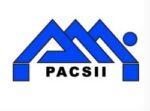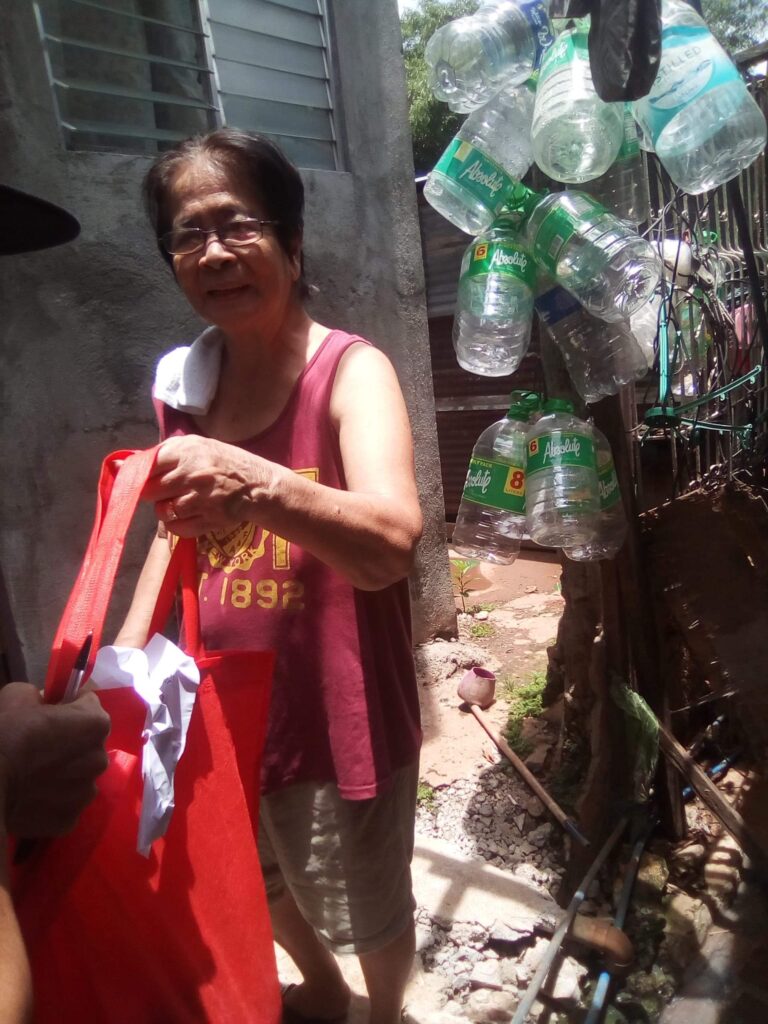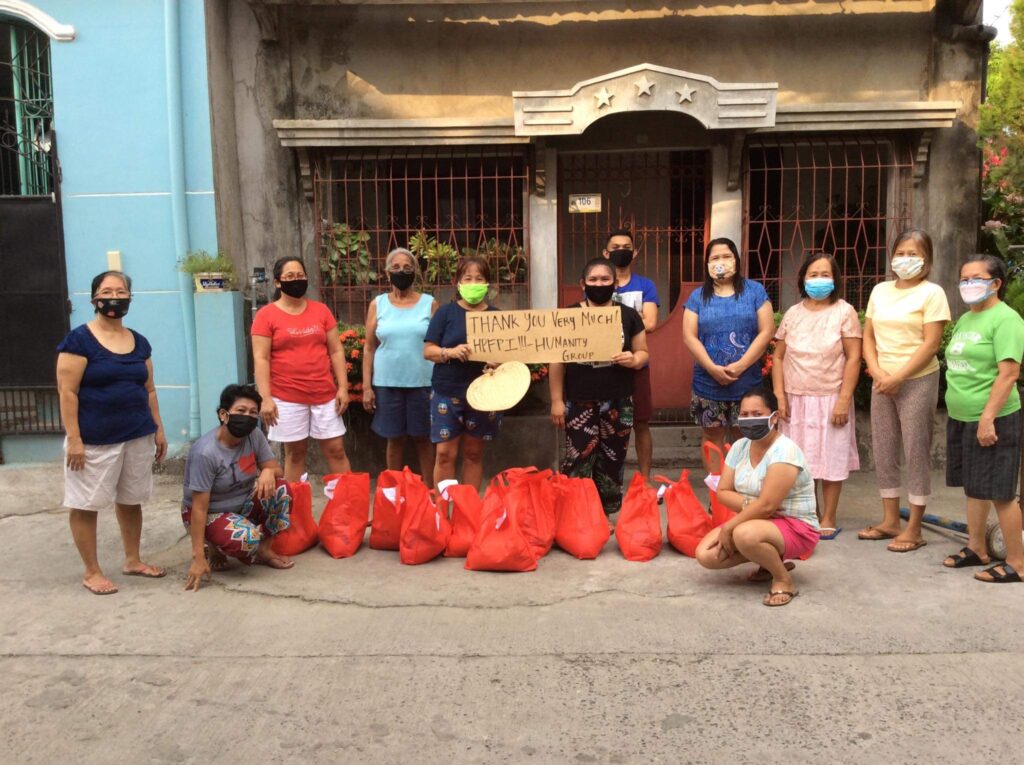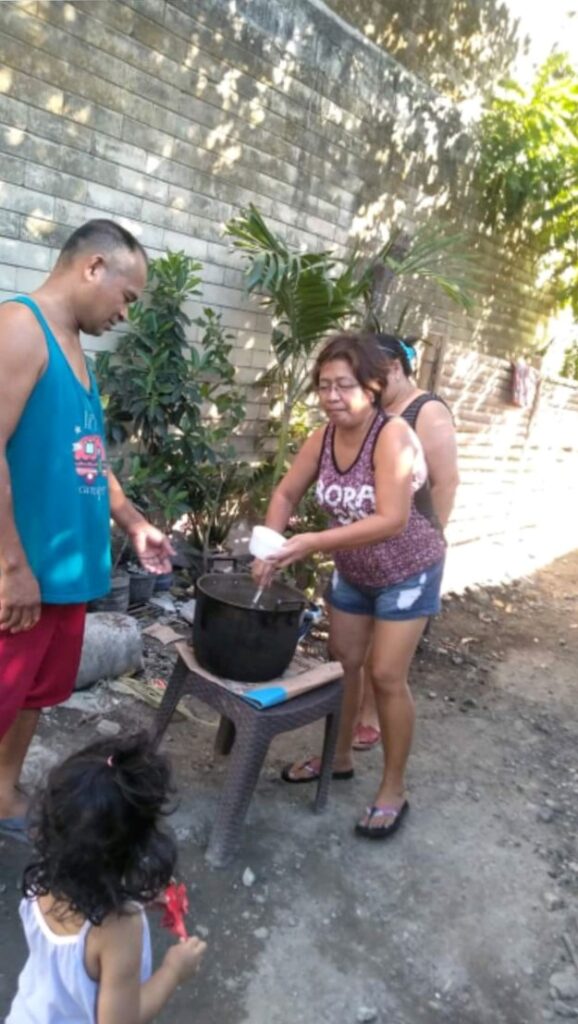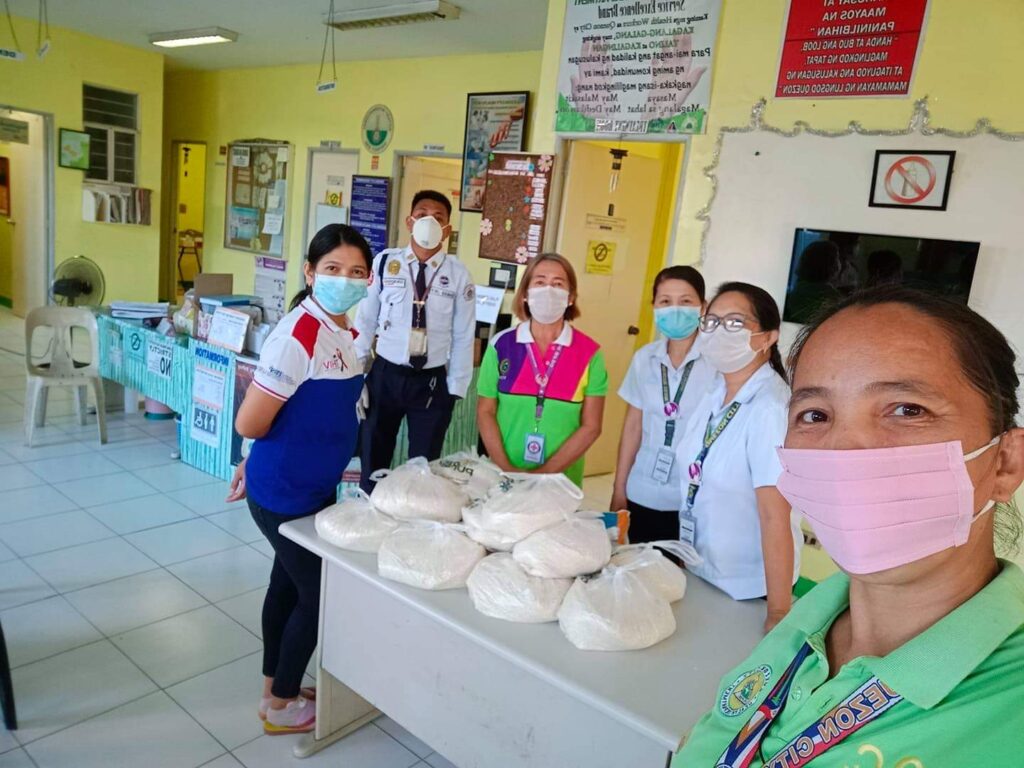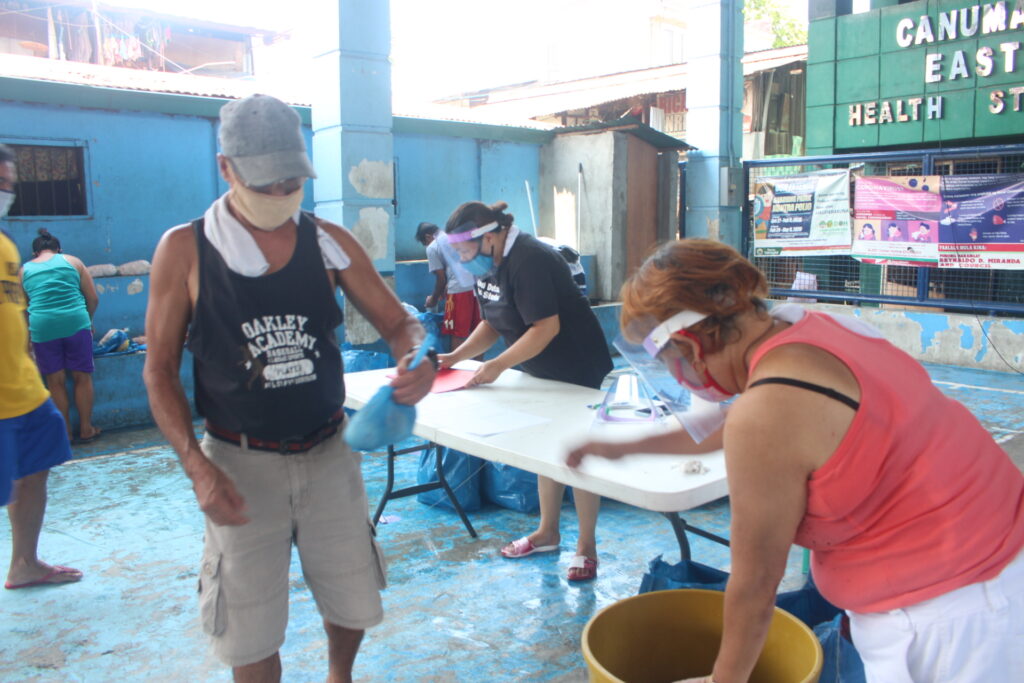By. Fr. Rolando A. Tuazon, CM
We are presenting this report in order to make our partners and donors aware of what has been going on in our communities during this time of the crisis. They are able to cope with the situation and are able to address the concerns of the communities because of the assistance that they have received from our partners and donors. We do this report with a profound sense of gratitude to all of them who have become God’s instrument in making us experience his Providence and care.
This report is based on the submitted updates coming from some of the regions and sub-regions of the Homeless People’s Federation Philippines Inc. (HPFPI). A questionnaire was sent to and was answered by the community leaders according to a designated format of report (see attachment 1: Some Reports from some Regions). There were several teleconferences that were participated in by the officers of each of the regions of the NCR, Bicol, Iloilo, Cebu, and Davao to do monitoring of the mobilizations in the different regions. The meetings included sharing of the many experiences of our people happening in the ground. There were also exchanges among the leaders of the challenges they have encountered, insights they have gained, and learnings they have realized. The teleconferences provided opportunity for each one to learn from each other in terms of handling the situations and facing up to the challenges they have in the communities.
- PLANNING IN THE NATIONAL AND REGIONAL LEVELS
After HPFPI received the approval of its proposal for support from SDI and ACHR through PACSII with a contract signed by the involved parties, the National Council of the HPFPI called for a meeting of the heads of the different regions and sub-regions last April 11, 2020. The HPFPI leaders (national and regional) discuss in greater detail how the different communities are affected by the crisis, especially the most vulnerable. They came up with initial plans that would enable them systematically respond to the situation in terms of concrete assistance to the poorest in the communities.
That plan includes the following; (a) Identifying the most vulnerable in the communities and also updating of the baseline data of the Federation and of the HOAs and Community Associations per region; (b) Come up with immediate intervention for the communities in terms of the prevention of the spread of the disease and the mitigation of the impact of the pandemic and the consequent lockdown of cities and regions; (c) Ways of coordinating, collaborating and partnering with government and non-government institutions; (d) Partitioning of the available funds coming from SDI per region; (e) Management of resources and funds with proper accountability and transparency; (f) Putting up network of communication among members of the region for easier coordination.
The regional heads have taken initiatives to also discuss the same in the level of their member communities/HOAs. Considering the difficulties of the transfer of funds to each of the region, as many banks, like ours, remain closed, each of the regions will have to make use first of their savings to finance their operations and interventions in the communities.
The realization that the funds given by the partner organizations were very limited compared to the need of so many families (more than 9,000 families all over the country), we took the initiative a raising more funds from friends and benefactors. In a matter of two weeks we were able to raise a substantial amount and more teleconferences were held in order to see which communities would need immediate financial assistance.
- UPDATING OF COMMUNITY DATABASE
The crisis has given a reason for our leaders to update their community profiles in terms of active membership and other basic information. Attached is the master list of all the communities of the HPFPI in the different regions, identifying the name of the leader of each of the community or homeowners association, and indicating the number of families per region (see attachment 6: Roster of the Member Communities/HOAs of the HPFPI). This master list is gradually being revised based on the reports that come from the HOAs and Community Associations from each region. It is interesting to note that some leaders have expressed their delight on the fact that the updating they are doing has become a little easier. The members see the greater need for them to cooperate in this initiative. This updated profile of each of the community will be the basis for the leaders (local and national) to identify the most vulnerable (the elderly, infants/children, the PWDS) in our communities, establish priorities and make the necessary interventions during this time of crisis (Valenzuela, Davao, Iloilo).
Because of the lockdown, the geographical distance of some member communities as well as the poor digital connection in the country, some regional leaders have also expressed their difficulties to gather and collate updated data.
- PREVENTION OF SPREAD OF THE VIRUS
As stipulated in the contract, one of the main concerns of the communities, which are characteristically congested, is to prevent the spread of the virus in their neighbourhoods. Several actions are being done to ensure that such objective is achieved:
- Information Drive and Awareness Campaign
There has been an enormous amount of information available in the national TV and radio networks to make people aware of the nature of the disease, of its spread, and of the government programs to address the crisis. What our leaders do is to make follow-ups to ensure that such awareness drive gets into every family living in their communities. Considering that it is not allowed to conduct meetings or gather people in one place as the rule of social distancing would not allow it, this is done by some during the time of distribution of assistance to the families. It was noted during the conference that people should be informed to identify the more reliable sources of information, considering that a lot of fake news flourish, especially in social media. (Most communities in the different regions)
- Ensuring People’s Compliance to Government Restrictions
The government has imposed some measures to contain the spread of the virus. They include the following: (a) Blocking whole areas to prevent people’s free movement; (b) social distancing; (c) curfew for everyone (8pm – 5 am); (d) Use of Quarantine Pass available only to one member of the family to go out to buy food or for a very few to work as front-lines; (e) Home stay for almost all, most strictly imposed on senior citizens; (f) Wearing of facemasks; (g) Practice good hygiene, like washing of hands; (h) Go for medical check-up and assistance when one develops symptoms of the disease, etc. (Davao, Cebu, Valenzuela, Iloilo, Muntinlupa)
This is one area, we shall later see, where our Homeowners Association leaders are closely working with the local government units. In coordination with government agencies, we have communities who put up their own controls and blockages at the entrance of their communities checking on who comes in or goes out of their areas, with some preventing non-residents to enter community jurisdiction (Davao, Valenzuela, Cebu, Batasan, Rodriguez-Rizal, NCR). Some communities even spent money to acquire thermal scanners which enable them to monitor the health condition of those who enter their community protected areas. Use of megaphones for announcements in communities. (Cebu, Muntinlupa)
Facemasks, alcohol, soap. Vitamins and other items were also distributed in the communities in order to protect people from being infected.
- Cleaning and Disinfecting Common Areas within the community
Local government units have made efforts to disinfect the commonly used areas, like public markets, roads, etc. Our own leaders have made efforts to put up mechanisms that would ensure that people who go in and out of their communities are disinfected. They put rags soaked in disinfectant chemical in the main entrance and also disinfect car wheels who come into the community area (Rodriguez-Rizal, Valenzuela, NCR, Davao, etc.). There are some communities of the HPFPI who have built common washing structures so that people used by many who enter their community areas (Iloilo). Many receive disinfectant materials from the government to disinfect their houses. There are those who volunteer to do community cleaning of canals, and disinfecting common areas in the communities (Davao).
- Provision of disinfectants, alcohol, masks, vitamins, etc.
Most of the regions have procured materials for good hygiene and for protection from the virus. They have distributed protective materials, like soap, alcohol, masks, etc. in their communities. There are some who take the initiative of coming up with washable masks which are getting more difficult to acquire from stores. Some communities have procured and distributed medicines and vitamins, especially for the elderly (Davao, Digos, Kidapawan, Iloilo, Valenzuela, Cebu).
- MITIGATION OF THE EFFECTS OF THE CRISIS
The tremendous impact of the crisis is most greatly felt in the communities, especially among the homeless peoples in depressed areas of the urban centres. It has now become a question of survival as basic needs are hardly addressed by people who have lost their daily income because of the lockdown.
- Relief Operation
The main bulk of the funds are being spent for relief operations. Considering that the majority have lost their sources of income and livelihood, people have little or no capacity to provide for their basic needs for survival, like food, water, etc. The initial response to address the needs of the communities come from the savings of the community. They have made use of their disaster fund. Some lent members of the community from their savings without interest. The financial assistance extended by SDI and the other sources of donations have made the communities cope with the crisis. The heads of the sub-region/s or of the communities (HOAs) buy materials in bulk and have some individuals repack them for distribution for each of the families in their neighbourhood. The relief goods normally contain 3 or 5 kilos of rice, canned sardines, instant noodles, biscuits, coffee and other items (the regional leaders determine which items are really more needed). The most vulnerable families are the ones benefitted by the limited resources. In some areas, like at the NCR, PACSII was able to coordinate with some groups or individuals who have distributed bags of goods to every member of the communities (total amount of goods received per family per region will form part of the final report). (all areas and regions)
Following the guidelines for procurement, they make sure that they secure receipts from their suppliers. They try to be creative in sourcing out for the most affordable, yet goods that meet standard quality.
- Special Provision, like milk for the babies and medicine for the elderly
Considering that there are people in the communities who are most vulnerable, like babies, and elderly who would have special needs for milk or medicine respectively, certain acquisitions of such goods are made by the community leaders who distribute such products to them. The quarantine rules and the preventive measures to protect people especially apply to them. (Rodriguez Rizal, Iloilo, Muntinlupa, Rodriguez-Rizal, etc.).
- Community Kitchen/Food Sharing among Members of the Community
The spirit of solidarity is visible in many communities. Individual families share their food to their neighbours, especially those in greater need (Davao). There are communities who have decided to put up their community kitchen where they do common food preparation once a day. Those who have more resources are able to share in the expenses and others would help in the actual food preparation. They do this conscious of the fact that they still have to maintain social distancing. A member of the family goes out to the centre in order to get their own share of food (Iloilo, etc.).
One community has put up a community kitchen for the frontliners, in their communities (Valenzuela, Iloilo, Rodriguez-Rizal)
- Gardening in view of Food Security
With the problems of availability of food, certain groups encourage their community members to have community or family gardens. Backyard or vertical gardening has proven to be reliable during times of crisis. There are local governments who have started distributing seeds for people, even in urban centres to produce food. (Albay, Rodriguez-Rizal)
- Assistance to the Sick
Because of the preventive measures the communities have decided to implement in their settlements, there are no confirmed cases of COVID 19 in majority of the areas of our member HOAs and community associations. In a very few areas of HPFPI, where there are individuals who get sick, our community leaders are making every effort to identify and report them to those who could provide medical interventions. Some are afraid to go to the hospitals worried that they could get infected. Community leaders educate the families regarding this. They help those who get sick to go to the hospital or stay in community health centre in coordination with their local government unit (Cebu).
- NETWORK WITH GOVERNMENT, NGOS, AND OTHER GROUPS
With very strict implementation of the Government imposed policies on Enhanced Community Quarantine, only very few people are tapped to serve as frontlines for the extremely needed services. Many of our community leaders find it difficult to organize mobilizations in our grass-root communities. Yet, there are some HPFPI leaders along with some of their members in the different regions who are able to collaborate with the local government units. Some local government units find it easier to work with organized groups in the implementation of their programs.
- HPFPI Community Leaders’ Collaboration with Government
Some of our leaders in the local and regional levels are able to network with the government through its agencies, like the Department of Social Welfare and Development (DSWD), in the following ways: (a) Identification of the most vulnerable members of the community. The available databank of our community associations or HOAs has facilitated a more systematic way of making interventions. This is important for the distribution of the government’s relief goods and cash in relation to amelioration program; (b) Implementing the rules and policies of the government in the level of the community; (c) Repacking of goods which will be distributed to the poorest and most vulnerable members of the communities; (d) Doing some tasks to like disinfecting, distribution of goods, etc.; (e) Health monitoring in the communities; (f) Putting up of Volunteer Security Personnel. (Davao, Cebu, Valenzuela, Iloilo, Rodriguez-Rizal, Muntinlupa, etc.).
- Partnering with Other Organizations and Institutions
HPFPI started as a church-based organization. Among the original groups, there are still a good number of membership who are actively involved in the Church. During the crisis, such affiliations have benefitted our members by the Church relief operations as beneficiaries or volunteers of services.
Some of our communities are able to partner with Academic Institutions (State Universities) in the more scientific ways of doing community profiling and database building (Iloilo, Valenzuela, Muntinlupa, etc.).
Because of the organized nature of their communities, it becomes easier for some private institutions to tie up with our leaders to address some concerns in the communities.
- FUND AND RESOURCE MOBILIZATION
In order to make the above interventions, it is necessary to have funds and resources-mobilization. They have come to the communities in different ways:
- Savings of the Communities
Shortly after the lockdown, when government assistance has not been organized yet for people in the urban poor communities who are beginning to feel the bad effects of the imposed Enhanced Community Quarantine, some of our communities have decided to use the meagre resources they have from their savings in order to make the necessary critical intervention of making food available for the very poor families. The savings of the communities have been initially earmarked for certain important needs or projects they have, like site-development, etc. (Valenzuela, Iloilo, Cebu, Davao, Digos, Kidapawan, Quezon City)
- Government Assistance
The government response to the basic needs of people for survival has been perceived to be very slow and inadequate in many areas. There are local government units who would distribute only 1 kilo of rice, 1 canned sardines and 1 pack of instant noodles which is meant to help the family to survive for a week. There was the second batch, normally with more items, that came from the city which is also done for one week. The national government has announced the distribution of 5,000 to 8,000 pesos for each of the families. When actual implementation started, more than half who were expecting did not receive such promised assistance.
- Fund coming from SDI and ACHR
The funds that come from SDI was a very good news for our communities of the HPFPI. Each region was allocated 150,000 pesos. The remaining 50,000 from the 500,000 pesos (equivalent of 10,000 USD), will be reserved temporarily by the central office of the HPFPI. We were able to work out with ACHR to allow HPFPI to use an additional 300,000 pesos to be added to the available funds to be partitioned in three (100,000 each) for each of the three regions. So for the operations in the regions as stated above, they could work on an initial fund of 250,000 each.
- Private Groups and Church’s Relief Operations
Many communities have expressed gratitude that there are groups, especially the parishes, church and religious organizations, who distribute relief goods to the poorest of the poor in many urban poor settlements. Caritas Manila, for example, became a conduit of funds, amounting to 1.3 billion pesos, donated by big companies. Most parishes in the greater Manila area receive more or less a million-pesos worth of gift checks which they have distributed to their poor parishioners – 1,000 worth-gift check for each one. Some of our members benefitted from this. (Muntinlupa, NCR, Davao, etc.) There are some groups who have been able to make concessions with private business to condone payment of rental fees for houses and for utilities, like water. (Cebu)
- PACSII Fundraising for the HPFPI
Because of the enormity of the needs of our sizeable membership, PACSII has taken the initiative to build more funds to augment the subsidy that should be provided for in each of the three regions. At the moment, a little more than one and a half million pesos (30,000.00 USD) have been donated by individuals and local companies for the communities. Apart from this, some homeowners or community associations have taken initiatives to also solicit funds through online fund-raising for the on-going survival of their communities (Valenzuela).
We are grateful that individuals and companies partnered with us by providing financial assistance and goods/supplies: C.B. Andrew Capital Inc., Minor Basilica of the Black Nazarene, Ladies of Charity, San Miguel Corporation, Caritas Manila, Chemlux Incorporated, Asian United Bank, CM Province’s Vincent Helps, and the Sandigan Foundation of the Philippines. There were very generous friends who also shared and contributed to our initiative (attached list is kept in our records).
These donations from private companies and individuals have been a great help for the many communities. Several tranches of substantial amount from these donations were sent to the different regions and sub-regions, adding to the limited amount advanced to the communities from SDI and ACHR The regional or sub-regional officers took care of procuring goods for their own relief operations in the region.
- CHALLENGES
There are a lot of challenges that the communities have identified in their situation as well as in their efforts to address such situation
a. The government-imposed lockdown has made it so difficult for people to move, work, participate, travel, have access to resources, especially in bulk for relief operations, etc. But these conditions have not prevented everyone, especially community leaders to still get involved with government units and agencies. (Davao, Muntinlupa, Camarines Norte, Albay, Iloilo, NCR)
b. It is not easy to seek out assistance from other people or group. Yet, even with people extending financial assistance, the enormity of the needs for almost two months of the poor who are without income, continues to dwarf such initiatives. Our communities have found ways to address their concerns in creative ways. (Davao, Valenzuela, Rodriguez-Rizal)
c. Because of the lockdown, gathering people to meet, plan, discuss and communicate has been enormously difficult. There are leaders who could not do anything (Greenville-NCR, Albay, Camarines Norte) but there are others who have found ways to communicate through the internet and have digital meetings and cyber conferences. (Valenzuela, Iloilo, Davao)
d. Because of the living conditions of the urban poor, it has become more challenging to impose the home-stay policy of the government. Many young people find this especially challenging, reason why some violate the quarantine rules. (Muntinlupa)
e. The government and the people, just like in other places, have not been prepared for this disaster. There are not enough resources, organized systems and mechanisms, to help the citizenry to cope with the crisis. This crisis will give way to real serious economic crisis, like recession or even depression. (Davao, Cebu, Batasan NCR).
f. In the acquisition of goods, in the effort of ensuring accountability, by securing receipts, the items become a little more expensive compared to when there are no receipts. In some cases it is really very difficult to get receipts for the procured materials. (Cebu).
- REALIZATIONS, LEARNINGS AND INSIGHTS
a. Greater Appreciation for Disaster Preparedness
Nobody, not even the most advanced nations, was prepared for pandemic crisis like this one. Everyone has been badly affected. (Davao, etc.)
It is important also for HPFPI to give attention to the health aspect of the life of the community. (Davao)
Need to have emergency fund for disasters and crisis (Iloilo).
It is important to have updated baseline data and community mapping in order to help identify the most vulnerable areas. (Davao)
b. Greater appreciation of the People’s Participation
Members of the communities have expressed their appreciation of being part of an organization, like HPFPI and being involved in savings mobilization, etc. (Iloilo, Davao, Rodriguez-Rizal)
There is also a need to deepen political education on who should be in power who can really have commitment, capacity, efficiency, and good will to serve. (Iloilo)
The government will not succeed, for example, in the work of preventing the spread of the virus, without cooperation from everyone. (Davao)
c. There are Good Things the Crisis has brought about
Cleaner environment, more opportunities for family bonding, deeper appreciation of faith in God and His providence and the need to experience conversion and repentance. There are some communities who have organized common time for praying. The crisis has brought greater experience of unity, reconciliation, solidarity, and equality among people (both rich and poor). There was also a recognition of the fact that people are naturally good and generous during times of crisis. It is precisely in peoples’ openness and generosity to others that would enable many to cope with the crisis. (Davao, Iloilo, Valenzuela, Muntinlupa, Rodriguez-Rizal)
d. The Crisis has Made People Realize What are the Essentials in Life
What people considered absolutes before have been rendered relative, and some things they take for granted are greatly appreciated. (Valenzuela) There is also a realization of the dignity of human life. (Batasan)
- CONCLUSION
Nobody has been really prepared for this crisis. We know that it has caused disruptions in the lives and works of our people and in the economy of our country, just as with the lives and economy of many other nations. Yet, we believe that such threat could be turned into opportunities for our people, especially among the urban poor. This happens when people rise up to the challenge and experience greater solidarity, committed leadership and creative ways of managing our lives toward a greater experience of empowerment.
